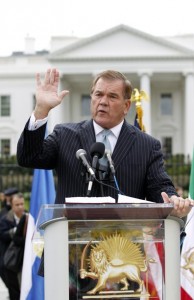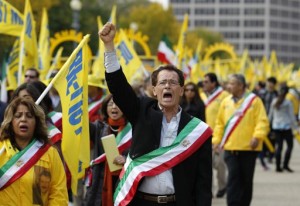THE WASHINGTON POST
Hundreds of Iranian Americans rallied outside the White House on Saturday, saying they’re worried that the Obama administration’s newly announced plan to withdraw U.S. troops from Iraq by year’s end will leave 3,400 Iranian exiles vulnerable in a settlement outside Baghdad.
The protesters also called on the Obama administration to remove Mujahedin-e Khalq, or MEK, the group affiliated with the exiles, from the State Department’s list of foreign terrorist organizations. The designation, protesters said, gives the Iraqi government an excuse to persecute residents of Camp Ashraf, which has been more like a small city, 40 miles north of Baghdad, since the mid-1980s.
Supporters from the Washington area and across the country said Iraqi forces are not allowing medicine into the 10-square-mile Ashraf compound and have twice attacked its unarmed residents since July 2009, killing about 45 people and injuring hundreds. Many protesters said they fear a massacre there after U.S. troops leave Iraq.

Former Secretary of Homeland Security Tom Ridge speaks to a crowd of hundreds protesting in front of the White House in Washington Saturday, Oct. 22, 2011. Ridge spoke in support of the call for the de-listing of an Iranian opposition group, Mujahedin-e Khalq (MEK) from the U.S. terror list. The group also called on President Barack Obama to protect Ashraf, the Iranian refugee camp in Iraq. (AP Photo/Jose Luis Magana)
“Whenever the U.S. says ‘Don’t execute these people’ or ‘Don’t send them back to Iran,’ they [Iraqi authorities] can say ‘Why not? We’re killing terrorists for you,’ ” said Amir Emadi, a graduate student from San Diego. His parents and 19 relatives live in Ashraf.
MEK formed in Iran in the 1960s to overthrow the U.S.-backed shah, and in the 1970s it assassinated several U.S. military personnel and American civilians working in Tehran, according to a 2007 State Department report. It also “supported the violent takeover in 1979 of the U.S. Embassy in Tehran,” the report said.
In the mid-1980s, the group moved to Iraq, where it helped Saddam Hussein’s regime fight in Iraq’s war against Iran.
After the 2003 invasion of Iraq, the United States agreed to protect the residents of Ashraf if MEK gave up its weapons. The United States transferred Ashraf to Iraqi control in 2009. Iraq’s government, eyeing MEK’s past affiliation with Hussein, has tried to make the Ashraf residents leave.
Obama administration officials have said the MEK, headquartered in Paris, has been listed as a foreign terrorist organization since 1997 because of its history of violence. The State Department reportsaid “MEK’s leadership and members across the world maintain the capacity and will to commit terrorist acts in Europe, the Middle East, the United States, Canada and beyond.”
On Saturday, joined by former Homeland Security secretary Tom Ridge and former Pennsylvania governor Ed Rendell, several protesters said recent allegations of an Iranian plot to kill the Saudi ambassador to Washington prove that the Obama administration needs to take a harder line.
“You cannot negotiate with Iran!” Ridge exclaimed to cheers, beating drums and chants of “MEK, yes. Mullahs, no! They are terrorists. They must go!”
Since renouncing violence in 2001, protesters said, MEK has not been linked to any attacks.

Demonstrators chant during a march in Washington after rallying in front of the White House Saturday, Oct. 22, 2011. Hundreds of people rallied, demanding that an Iranian opposition group, Mujahedin-e Khalq (MEK) be removed from a U.S. terror list. (AP Photo/Jose Luis Magana)
At Homeland Security, Ridge was given a daily list of terrorist threats, he said. “Never once did I see a threat to the people of the U.S. from the people of Camp Ashraf,” he told the crowd.
A similar protest outside the State Department in August drew thousands. Saturday’s protesters on Pennsylvania Avenue hoisted yellow flags saying “De-list MEK” and “Protect Ashraf,” as curious tourists looked on. The rally was organized by the Iranian American Professionals and Scholars of Maryland.
Rally leaders said the United States should protect Ashraf with its own troops or urge United Nations security forces to guard it until the exiles can be repatriated.
“We gave our word to protect these people,” Rendell said.
Majid Sadeghpour, a pharmacist who lives in Falls Church, said his brother was executed in Iran in 1989 after being imprisoned for carrying an MEK newspaper. The MEK’s listing as a terrorist group undermines the work of those who want to see Iran governed by a secular democracy, he said.
“We can’t do that,” Sadeghpour said, “when our most organized, capable resistance has been tagged as terrorists.”
